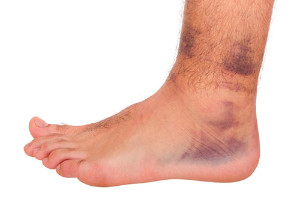
An acute ankle sprain occurs when the ligaments around the ankle are stretched or torn due to sudden twisting or impact. This injury typically happens during activities that involve jumping, running, or uneven surfaces, causing the ankle to roll or twist beyond its normal range of motion. The ligaments on the outside of the ankle are most often affected, although other ligaments can be injured as well. An acute sprain can occur in any age group, but it is especially common among athletes or individuals who engage in high-intensity physical activities. Risk factors include weak ankle muscles, improper footwear, or a previous ankle injury, which can make the ankle joint more vulnerable. The severity of the sprain can vary, with symptoms ranging from mild pain and swelling to more severe pain, bruising, and limited mobility. If you have injured or sprained your ankle, it is suggested that you promptly schedule an appointment with a podiatrist who can offer you appropriate treatment solutions.
Ankle sprains are common but need immediate attention. If you need your feet checked, contact Brian Shwer, DPM from Southaven Foot Clinic. Our doctor can provide the care you need to keep you pain-free and on your feet.
How Does an Ankle Sprain Occur?
Ankle sprains take place when the ligaments in your ankle are torn or stretched beyond their limits. There are multiple ways that the ankle can become injured, including twisting or rolling over onto your ankle, putting undue stress on it, or causing trauma to the ankle itself.
What Are the Symptoms?
Preventing a Sprain
Treatment of a Sprain
Treatment of a sprain depends on the severity. Many times, people are told to rest and remain off their feet completely, while others are given an air cast. If the sprain is very severe, surgery may be required.
If you have suffered an ankle sprain previously, you may want to consider additional support such as a brace and regular exercises to strengthen the ankle.
If you have any questions please feel free to contact our office located in Southaven, MS . We offer the newest diagnostic and treatment technologies for all your foot and ankle needs.
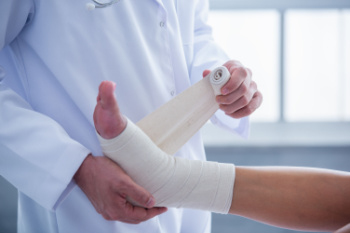
A broken foot can happen due to trauma like falls, sports injuries, or car accidents, as well as repetitive stress from activities such as running. It can affect anyone, but those at a higher risk include athletes, older adults, and individuals with osteoporosis. Symptoms include pain, swelling, bruising, difficulty walking, and deformity. If you suspect a broken foot, avoid putting weight on it and elevate it to reduce swelling. Immobilize the foot as much as possible and seek medical attention promptly. A podiatrist can diagnose the injury using imaging like X-rays and recommend treatment, which may include casting, bracing, or in severe cases, surgery. If you have broken your foot, it is strongly suggested that you see a podiatrist for proper care and healing.
A broken foot requires immediate medical attention and treatment. If you need your feet checked, contact Brian Shwer, DPM from Southaven Foot Clinic. Our doctor can provide the care you need to keep you pain-free and on your feet.
Broken Foot Causes, Symptoms, and Treatment
A broken foot is caused by one of the bones in the foot typically breaking when bended, crushed, or stretched beyond its natural capabilities. Usually the location of the fracture indicates how the break occurred, whether it was through an object, fall, or any other type of injury.
Common Symptoms of Broken Feet:
Those that suspect they have a broken foot shoot seek urgent medical attention where a medical professional could diagnose the severity.
Treatment for broken bones varies depending on the cause, severity and location. Some will require the use of splints, casts or crutches while others could even involve surgery to repair the broken bones. Personal care includes the use of ice and keeping the foot stabilized and elevated.
If you have any questions please feel free to contact our office located in Southaven, MS . We offer the newest diagnostic and treatment technologies for all your foot and ankle needs.

Toenail fungus, also known as onychomycosis, causes nails to become thickened, discolored, and brittle. Laser treatment is a modern approach that uses concentrated light to target the fungus beneath the nail. The aim is to halt the growth of the fungus and promote healthier nails over time. This non-invasive treatment typically involves little to no discomfort, with most patients resuming normal activities immediately after a session. Results of laser toenail treatment may take several months to appear due to the slow regrowth of toenails. Multiple sessions may be necessary, as the effectiveness can vary based on the type of laser used and the severity of the infection. Laser toenail therapy also offers an alternative for people who cannot tolerate oral medications or who prefer to avoid their potential side effects. A podiatrist can evaluate the condition of your nails, recommend appropriate treatment options, and monitor your progress throughout the process. If you have developed a toenail fungus, it is suggested that you make an appointment with a podiatrist for an exam and to find out if laser toenail treatment is best for you.
If left untreated, toenail fungus may spread to other toenails, skin, or even fingernails. If you suspect you have toenail fungus it is important to seek treatment right away. For more information about treatment, contact Brian Shwer, DPM of Southaven Foot Clinic. Our doctor can provide the care you need to keep you pain-free and on your feet.
Symptoms
Treatment
If self-care strategies and over-the-counter medications does not help your fungus, your podiatrist may give you a prescription drug instead. Even if you find relief from your toenail fungus symptoms, you may experience a repeat infection in the future.
Prevention
In order to prevent getting toenail fungus in the future, you should always make sure to wash your feet with soap and water. After washing, it is important to dry your feet thoroughly especially in between the toes. When trimming your toenails, be sure to trim straight across instead of in a rounded shape. It is crucial not to cover up discolored nails with nail polish because that will prevent your nail from being able to “breathe”.
In some cases, surgical procedure may be needed to remove the toenail fungus. Consult with your podiatrist about the best treatment options for your case of toenail fungus.
If you have any questions, please feel free to contact our office located in Southaven, MS . We offer the newest diagnostic and treatment technologies for all your foot care needs.
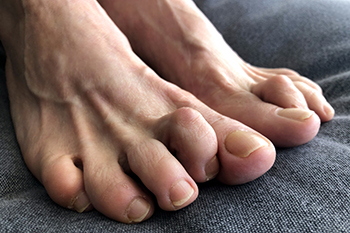
Hammertoe is a deformity of the toe in which the middle joint becomes bent downward, creating a hammer-like appearance. This condition most often affects the second, third, or fourth toes. Hammertoe can develop due to an imbalance in the muscles, tendons, or ligaments that control the toe’s movement. Causes include wearing ill-fitting shoes that crowd the toes, especially high heels, or inherited foot structure. Conditions such as arthritis, diabetes, or neurological disorders can also contribute to the development of hammertoe. Symptoms of hammertoe include pain or discomfort in the affected toe, especially when walking or wearing shoes. The toe may appear bent, and the joint may become stiff or rigid over time. Corns or calluses can also form on the top or tips of the affected toes due to friction with footwear. Hammertoe can be uncomfortable and unsightly. If you have developed this condition, it is suggested that you consult a podiatrist who can offer effective relief and treatment solutions.
Hammertoe
Hammertoes can be a painful condition to live with. For more information, contact Brian Shwer, DPM from Southaven Foot Clinic. Our doctor will answer any of your foot- and ankle-related questions.
Hammertoe is a foot deformity that affects the joints of the second, third, fourth, or fifth toes of your feet. It is a painful foot condition in which these toes curl and arch up, which can often lead to pain when wearing footwear.
Symptoms
Causes
Genetics – People who are genetically predisposed to hammertoe are often more susceptible
Arthritis – Because arthritis affects the joints in your toes, further deformities stemming from arthritis can occur
Trauma – Direct trauma to the toes could potentially lead to hammertoe
Ill-fitting shoes – Undue pressure on the front of the toes from ill-fitting shoes can potentially lead to the development of hammertoe
Treatment
Orthotics – Custom made inserts can be used to help relieve pressure placed on the toes and therefore relieve some of the pain associated with it
Medications – Oral medications such as anti-inflammatories or NSAIDs could be used to treat the pain and inflammation hammertoes causes. Injections of corticosteroids are also sometimes used
Surgery – In more severe cases where the hammertoes have become more rigid, foot surgery is a potential option
If you have any questions please contact our office located in Southaven, MS . We offer the newest diagnostic and treatment technologies for all your foot and ankle needs.
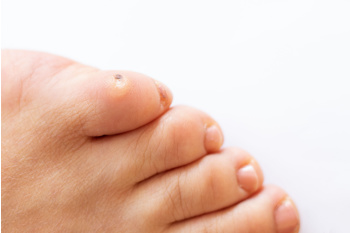
A corn on the foot is a small, thickened area of skin that forms due to friction or pressure. Corns are typically found on the tops, sides, or between the toes, where constant rubbing occurs. The skin hardens in response to the pressure, creating a raised, often painful area. Corns can be hard or soft, depending on their location and moisture level. Corns are painful because the pressure on the affected area causes irritation and inflammation, leading to discomfort, especially when walking or standing. The hard central core of a corn can press into deeper skin layers, causing sharp pain. The main causes of corns include wearing shoes that do not fit properly, abnormal foot mechanics, or activities that put excessive pressure on the feet. If you have developed a corn on your foot, it is suggested that you consult a podiatrist who can treat this painful condition.
Corns can make walking very painful and should be treated immediately. If you have questions regarding your feet and ankles, contact Brian Shwer, DPM of Southaven Foot Clinic. Our doctor will treat your foot and ankle needs.
Corns: What Are They? And How Do You Get Rid of Them?
Corns are thickened areas on the skin that can become painful. They are caused by excessive pressure and friction on the skin. Corns press into the deeper layers of the skin and are usually round in shape.
Ways to Prevent Corns
There are many ways to get rid of painful corns such as:
Treating Corns
Although most corns slowly disappear when the friction or pressure stops, this isn’t always the case. Consult with your podiatrist to determine the best treatment option for your case of corns.
If you have any questions please feel free to contact our office located in Southaven, MS . We offer the newest diagnostic and treatment technologies for all your foot and ankle needs.
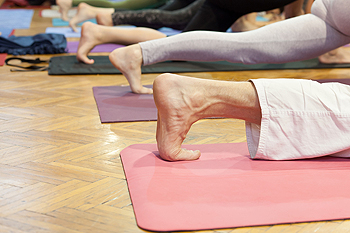
Flat feet, also known as fallen arches, is a condition where the arch of the foot collapses, causing the entire sole to make contact with the ground. This can lead to discomfort, pain, and increased risk of other foot and joint problems. The condition can be caused by genetics, injury, or conditions such as obesity or aging. Yoga can be an effective way to relieve the discomfort caused by flat feet. Specific stretches help strengthen the muscles of the feet and lower legs, improving support for the arch. Poses such as downward dog, warrior 1, and tree pose focus on enhancing foot stability and flexibility. Additionally, yoga promotes proper alignment and body awareness, which can reduce the strain on the feet and prevent further complications. Regular yoga practice can improve overall foot strength and flexibility, providing relief and potentially preventing the progression of flat feet. If you have flat feet, it is suggested that you are under the care of a podiatrist who can offer effective relief tips, which can include specific yoga stretches.
Why Stretching Is Important for Your Feet
Stretching the feet is a great way to prevent injuries. If you have any concerns with your feet consult with Brian Shwer, DPM from Southaven Foot Clinic. Our doctor will assess your condition and provide you with quality foot and ankle treatment.
Stretching the Feet
Stretching the muscles in the foot is an important part in any physical activity. Feet that are tight can lead to less flexibility and make you more prone to injury. One of the most common forms of foot pain, plantar fasciitis, can be stretched out to help ease the pain. Stretching can not only ease pain from plantar fasciitis but also prevent it as well. However, it is important to see a podiatrist first to determine if stretching is right for you. Podiatrists can also recommend other ways to stretch your feet. Once you know whether stretching is right for you, here are some excellent stretches you can do.
It is best to go easy when first stretching your foot and work your way up. If your foot starts hurting, stop exercising to ice and rest the foot. It is advised that you then see a podiatrist for help.
If you have any questions, please feel free to contact our office located in Southaven, MS . We offer the newest diagnostic and treatment technologies for all your foot care needs.
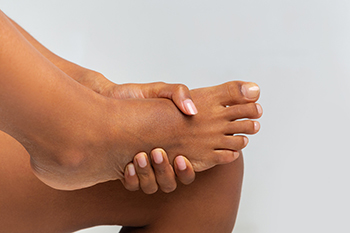
Foot drop, also known as drop foot, is a condition where lifting the front part of the foot becomes difficult, causing it to drag while walking. It results from weakness or paralysis of the muscles that lift the foot, often due to nerve damage, muscle disorders, or brain and spinal cord conditions like stroke or multiple sclerosis. Common causes include peroneal nerve injury, herniated discs, diabetes, or neurological disorders. Anyone can develop foot drop, but it is more likely in those with conditions affecting the nerves or muscles. Symptoms include dragging the toes, difficulty walking, and a steppage gait, where the knee lifts higher than usual. Diagnosis involves a physical exam, imaging like an MRI scan, and nerve conduction studies. Treatments may include braces, targeted exercises, or surgery in severe cases. If you have this uncomfortable condition, it is strongly suggested that you consult a podiatrist who can offer a personalized approach to manage foot drop effectively.
Foot Pain
Foot pain can be extremely painful and debilitating. If you have a foot pain, consult with Brian Shwer, DPM from Southaven Foot Clinic. Our doctor will assess your condition and provide you with quality foot and ankle treatment.
Causes
Foot pain is a very broad condition that could be caused by one or more ailments. The most common include:
Diagnosis
To figure out the cause of foot pain, podiatrists utilize several different methods. This can range from simple visual inspections and sensation tests to X-rays and MRI scans. Prior medical history, family medical history, and any recent physical traumatic events will all be taken into consideration for a proper diagnosis.
Treatment
Treatment depends upon the cause of the foot pain. Whether it is resting, staying off the foot, or having surgery; podiatrists have a number of treatment options available for foot pain.
If you have any questions, please feel free to contact our office located in Southaven, MS . We offer the newest diagnostic and treatment technologies for all your foot care needs.

An ankle sprain occurs when the ligaments surrounding the ankle joint are overstretched or torn, typically resulting from a twisting motion. This injury often causes immediate pain, swelling, and bruising around the ankle. People with an ankle sprain may experience difficulty walking, putting weight on the affected foot, or moving the ankle. More severe sprains can result in significant instability, where the ankle feels weak or gives way unexpectedly. Repeated or untreated sprains may lead to long-term joint pain or reduced mobility. A podiatrist can diagnose and treat ankle sprains with imaging tests, bracing, or other customized treatments to support healing and restore strength. If you believe you have sprained an ankle, it is suggested that you schedule an appointment with a podiatrist as quickly as possible so proper healing can begin.
Although ankle sprains are common, they aren’t always minor injuries. If you need your ankle injury looked at, contact Brian Shwer, DPM from Southaven Foot Clinic. Our doctor can provide the care you need to keep you pain-free and on your feet.
How Does an Ankle Sprain Occur?
Ankle sprains are the result of a tear in the ligaments within the ankle. These injuries may happen when you make a rapid shifting movement while your foot is planted. A less common way to sprain your ankle is when your ankle rolls inward while your foot turns outward.
What Are the Symptoms?
Preventing a Sprain
Treatment of a Sprain
In many cases, the RICE method (Rest, Ice, Compression, and Elevate) is used to treat ankle sprains. However, you should see a podiatrist to see which treatment option would work best with your injury. In severe cases, surgery may be required.
It is important to ask your doctor about rehab options after you receive treatment for your injury. Stretching, strength training, and balance exercises may help the ankle heal while also preventing further injury.
If you have any questions, please feel free to contact our office located in Southaven, MS . We offer the newest diagnostic and treatment technologies for all your foot care needs.